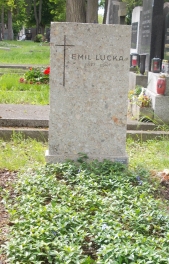Emil Lucka
Emil Lucka (born May 11, 1877 in Vienna ; † December 15, 1941 there ) was an Austrian writer .
Life
Lucka was the son of the businessman Robert Lucka and his wife Adele Taussig. The doctor Samuel Lucka was his uncle, the opera singer Pauline Lucka and the writer Mathilde Prager his cousins.
After graduating from high school , Lucka began to study history, art history and philosophy in his hometown. After her father's early death, Lucka dropped out of college to look after his mother and three sisters. He became an employee of the Zentral-Bodenbank in Vienna and at the same time published essays critical of culture in various magazines.
As soon as he could make a living from his literary work alone, Lucka gave up his job as a bank clerk. According to his own statements, Lucka was very much influenced by the philosophy of Immanuel Kant , but also by the work of his friend Otto Weininger . Lucka even adopted Weininger's anti-Semitism in a not very flattened form , as he felt close to "... everything Nordic and Germanic beings ...". In his later works, however, he distanced himself from it again.
In 1901 Lucka converted from Jewish to Catholic.
In 1927 he married Amalie Wenig in Vienna. In 1930 Lucka published "Fremdlinge", a biographical novel about the composer Anton Bruckner . In addition to his biography of Weininger, Lucka also published the widely acclaimed biographies of Dostoyevsky and Michelangelo .
Lucka was less fortunate with his plays; he was able to publish them, but they didn't catch on and were hardly played. The Vienna City Theater tried to come to an agreement; but since there was no success, they were not included in the repertoire.
After the connection of Austria to the German Reich Luckas works were not allowed to appear and he was even banned from writing occupied. From 1938 he earned his living from a small pension that had been given to him by the central land bank. Emil Lucka died on December 15, 1941 in Vienna at the age of 63 and was buried in the Vienna Central Cemetery (Group 34A, Row 2, Number 7).
Survival
Lucka's novel "Death and Life" is the subject of a conversation in Heimito from Doderer's novel Die Strudlhofstiege .
Works
- At the Star Well (1925)
- Isolde Weißhand (1909)
- The roar of the mountains (1918)
- Dostoevsky (1924)
- The three stages of eroticism (1913)
- Marriage Stories (1920)
- Fredegundis (1934)
- Gaia (1903)
- Limits of the Soul (1919)
- Heiligenrast (1918)
- The impresario (1937)
- A Virgin (1909)
- Michelangelo (1930)
- Otto Weininger (1905)
- The imagination. A Psychological Examination (1908)
- Starry Nights (1903)
- Death and Life (1907)
- The Transformation of Man (1934)
- Urgut of Mankind (1924)
In addition, some philosophical works
literature
- Holdings in the catalogs of the Austrian National Library Vienna
- P. Berger: Emil Lucka in the mirror of criticism . In: Neue Wiener Tagblatt, No. 129 (1937)
- Hanus: Lucka Emil. In: Austrian Biographical Lexicon 1815–1950 (ÖBL). Volume 5, Publishing House of the Austrian Academy of Sciences, Vienna 1972, p. 342 f. (Direct links on p. 342 , p. 343 ).
- Viktor Suchy: Lucka, Emil. In: New German Biography (NDB). Volume 15, Duncker & Humblot, Berlin 1987, ISBN 3-428-00196-6 , p. 273 f. ( Digitized version ).
- Emil Lucka. Memorial exhibition for the 100th birthday of the poet and philosopher, 05-17-06-06 1977 . Josefstädter Heimatmuseum, Vienna 1977
- Lucka, Emil. In: Lexicon of German-Jewish Authors . Volume 16: Lewi – Mehr. Edited by the Bibliographia Judaica archive. Saur, Munich 2008, ISBN 978-3-598-22696-0 , pp. 195-205.
- Volker Zotz : "The question of suffering: Emil Lucka." In: On the blissful islands . Berlin 2000 ( ISBN 3-89620-151-4 ), pp. 314-325
Web links
- Works by Emil Lucka in the Gutenberg-DE project
- Emil Lucka in the Internet Archive
| personal data | |
|---|---|
| SURNAME | Lucka, Emil |
| BRIEF DESCRIPTION | Austrian writer |
| DATE OF BIRTH | May 11, 1877 |
| PLACE OF BIRTH | Vienna |
| DATE OF DEATH | December 15, 1941 |
| Place of death | Vienna |
